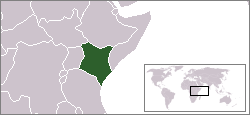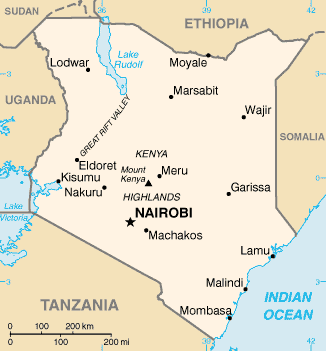Kenya
Kenya (pronounced KEN-ya; the pronunciation KEEN-ya is archaic) is a country of eastern Africa, bordering Ethiopia, Somalia, Sudan, Tanzania, Uganda and the Indian Ocean. Nairobi is its capital and largest city.
| |||||
| National motto: Harambee (Swahili, "Let's work together") | |||||
 | |||||
| Official languages | English, Kiswahili | ||||
| Capital | Nairobi | ||||
| President | Mwai Kibaki | ||||
| Area - Total - % water | Ranked 46th 582,650 km² 2.3% | ||||
| Population
- Density | Ranked 37th
53.4/km² | ||||
| Independence
- Recognised | (Event Xxxx)
(Year) | ||||
| Currency | Shilling | ||||
| Time zone | UTC +3 | ||||
| National anthem | Ee Mungu Nguvu Yetu (Oh God of All Creation) | ||||
| Internet TLD | .ke | ||||
| Calling Code | 254 (005 from Tanzania and Uganda) | ||||
History
Main article: History of Kenya
Fossils found in East Africa suggest that protohumans roamed the area more than 20 million years ago. Recent finds near Kenya's Lake Turkana indicate that hominids like Homo habilis and Homo erectus lived in Kenya 2.6 million years ago.
The colonial history of Kenya dates from the establishment of a German protectorate over the Sultan of Zanzibar's coastal possessions in 1885, followed by the arrival of the Imperial British East Africa Company in 1888. Incipient imperial rivalry was forestalled when Germany handed its coastal holdings to Britain in 1890.
From October 1952 to December 1959, Kenya was under a state of emergency arising from a rebellion against British rule. The first direct elections for Africans to the Legislative Council took place in 1957. Despite British hopes of handing power to "moderate" African rivals, it was the Kenya African National Union of Jomo Kenyatta, which formed a government shortly before Kenya became independent on December 12 1963. A year later, Kenyatta became Kenya's first president.
At Kenyatta's death in 1978, Daniel arap Moi became President, and in democratic multiparty elections in 1992 and 1997 won re-election. In 2002, Moi was constitutionally barred from running and Mwai Kibaki, was elected President.
Politics
Main article: Politics of Kenya
Ethnic divisions and a post-colonial constitution, (a classic example of an independence constitution) which gives the president nearly unlimited powers and immunity from the law, account for many of Kenya's problems. During the early 1990s, tribal clashes killed thousands and left tens of thousands homeless. US support kept the regime of Daniel arap Moi and his KANU party, which was western-leaning during the Cold War, in power from 1978 until 2002. Although the clause in the Kenyan constitution banning opposition parties was repealed in the 1990s (with the help of Smith Hempstone), Moi remained in power for a fourth term after the first multi-party elections in 1997 due to ethnic divides (which propoganda from his KANU party helped foment) in the opposition. In addition, the election in 1997 was also marred by violence and fraud. In 2002, Mwai Kibaki - sponsored by the NARC coalition - became the first opposition presidential candidate to win an election in the country since independence. His coalition, NARC, was held together largely on the promises of constitutional reform and the assurances that he would appoint representatives from each of Kenya's major ethnic groups to important positions. His negligence at fulfilling these obligations post-election have led to various strains, including the LDP splitting off from the NARC coalition. In addition, major voices from KANU--particularly Uhuru Kenyatta, son of first president Jomo Kenyatta--have been regaining popularity."Yote yawezakana bila Kibaki"(Everything is possible without Kibaki) is the silent slogan for these strains, and the incumbent president will face a tough challenge come the next general election in 2007.
Provinces
Main article: Provinces of Kenya

Kenya is divided into 7 provinces and 1 area*:
Geography
Main article: Geography of Kenya
Economy
Main article: Economy of Kenya
Kenya's main economic strengths include tourism and agriculture. The country is well placed to serve as an engine of growth in East Africa and the economy is only now beginning to show some growth after years of stagnation. Some argue that this is because of poor management and uneven commitment to reform, others insist that structural imbalances in world trade, particularly with regard to falling commodity prices and lack of access to western markets, have much to do with poor economic growth.
In 1993, the government of Kenya implemented a program of economic liberalization and reform that included the removal of import licensing, price controls, and foreign exchange controls. With the support of the World Bank, IMF, and other donors, the reforms led to a brief turnaround in economic performance following a period of negative growth in the early 1990s. One of the unintended consequence of freeing foreign exchange control was that it allowed a gold scam (Goldenberg) in which the Kenyan government lost over 600 million US dollars. This resulted in a weak currency which hindered economic improvement. Kenya's GDP grew 5% in 1995 and 4% in 1996, and inflation remained under control. Growth slowed in 1997-1999 however. Political violence damaged the tourist industry, and Kenya's Enhanced Structural Adjustment Program lapsed. A new economic team was put in place in 1999 to revitalize the reform effort, strengthen the civil service, and curb corruption, but wary donors continue to question the government's commitment to western establishment ideas of sound economic policy.
Considered by some to be long-term barriers to development are, electricity shortages, the government's continued and allegedly inefficient dominance of key sectors, corruption, the foreign debt burden, unstable international commodity prices, poor communication infrastructure and the country's high population growth rate.
Demographics
Main article: Demographics of Kenya
Ethnic tensions account for many of Kenya's problems. During the early 1990s, tribal clashes killed thousands and left tens of thousands homeless. Ethnically split opposition groups allowed the regime of Daniel arap Moi, in power from 1978 until 2002, to be re-elected for four terms, with the election in 1997 being marred by violence and fraud.
Ethnic groups: Kĩkũyũ 22%, Luhya 14%, Luo 13%, Kalenjin 12%, Kamba 11%, Kisii 6%, Meru 6%, other African 15%, non-African (Asian, European, and Arab) 1%
Religious affiliation: Various Protestant 38%, Roman Catholic 28%, Muslim 6%, Traditional Religions 22%.
See also: List of cities in Kenya, Maasai.
Culture
Main article: Culture of Kenya
Miscellaneous topics
- Communications in Kenya
- Established ISP Inter-Connect Ltd. [1]
- One of the major newspapers in Kenya is The Daily Nation. Daily Nation Online
- Oldest daily newspaper The Standard. The Standard
- Transportation in Kenya
- Kenya's National Airliner Kenya Airways.
- Military of Kenya
- Foreign relations of Kenya

